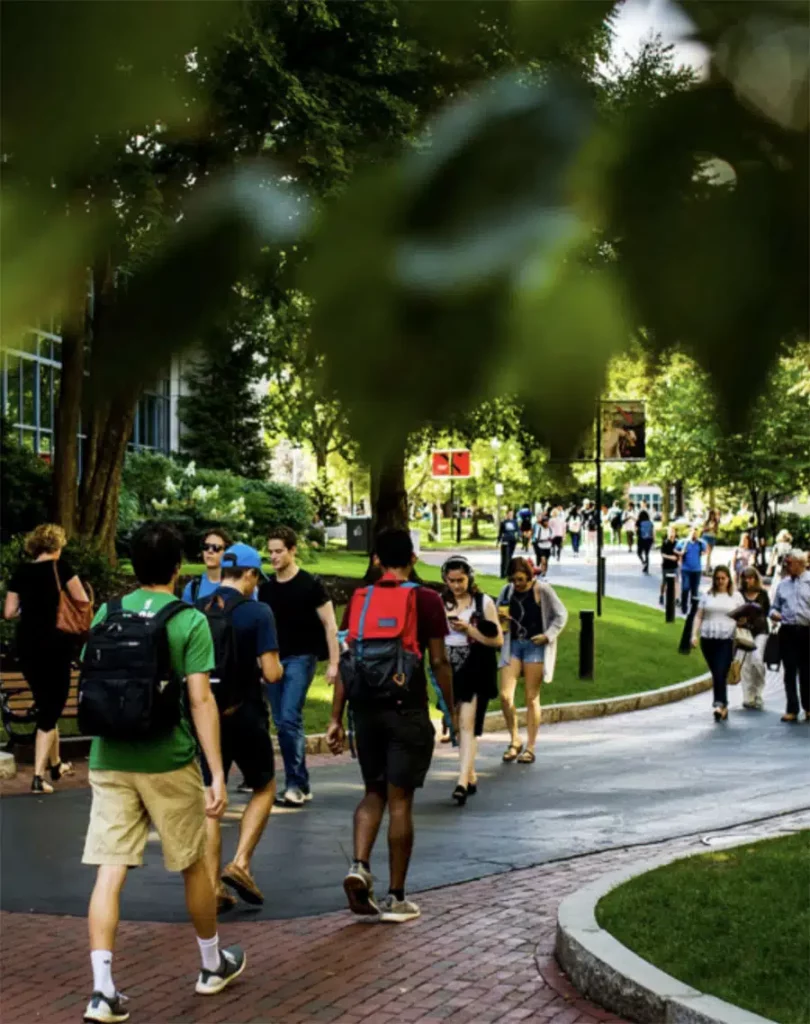YOU ARE BOUVÉ

School psychologists are behavioral health specialists who conduct psychological, educational and behavioral assessments for the purpose of designing effective interventions, counseling children and parents, consulting with teachers and parents, implementing and evaluating school-wide prevention programs and performing in-service training.


Northeastern University offers a Master of Science (MS) in School Psychology and a Certificate of Advanced Graduate Study (CAGS) in School Psychology. The entire three-year program (M.S. and CAGS) has full approval from the National Association of School Psychologists and the Massachusetts State Department of Education.
Distinctive features of our program include:
Our training approach incorporates the importance of interdisciplinary collaboration. Our students learn how to work on teams in delivering services, and how to draw upon the rich resources of professionals from related disciplines.
Our students have a strong professional identity and social conscience. The department has a very active student chapter of the school psychology division of the American Psychological Association (Student Affiliates in School Psychology-SASP).
This student chapter plans educational workshops, conferences, and social activities. Many of our alumni have assumed leadership roles in state and national organizations. In addition, they consider themselves advocates for the needs of children.
Degree type:
– MS in School Psychology
Study options:
– On ground (Boston Campus)
– Full-time only
– Fall admission only
Application deadlines:
Jan 15 (Priority Deadline)
June 15
Duration: 3 years (typically)
GRE: Not required
F1 Eligible: Yes
If you have questions or concerns regarding professional licensure, please contact program manager Robin Codding.
A cornerstone of Northeastern University and our program is practice-oriented education. We train students to become highly skilled scientific practitioners and lifelong learners, who employ the scientific, problem-solving method to evaluate their own practice.
Real world projects and work experiences are integrated into coursework and fieldwork. Students complete practicum and internship fieldwork requirements in local area schools. The faculty have developed a rich network of collaborative school psychologists who serve as excellent field supervisors. Faculty assist with placing students at school fieldwork sites in and around the Boston Metropolitan area.
During the third year internship students document their mastery of the training goals through comprehensive case studies.
Students complete 525 hours of field experience in school psychology during the first 2 years, including 75 hours of course-based practicum in the first year and 450 hours (roughly 2 days/week) of field-based practicum in the second year,
During the field-based practicum, students are expected to demonstrate their skills in the following core areas of school psychology:
In accordance with the National Association of School Psychologists (NASP) and Massachusetts Department of Education (DOE) requirements for certification/licensure in school psychology, students are required to attain a minimum of 1200 hours of field experience during their internship in school psychology.
Internship students are enrolled in a seminar course during the internship year. A university supervisor, who is a certified school psychologist, instructs this course. For internship within Massachusetts, the university supervisor maintains contact with the field supervisor through three site visits. At the end of the internship year, the field supervisor and university supervisor determine if the student has progressed adequately in the major competency areas.

Free Career Guide:

Explore possible career paths and identify the essential skills needed to advance in the industry.
Sample curriculum, subject to change.
The MS/CAGS program in school psychology requires a total of 62 semester hours, including a full-year internship. Students electing to pursue the Applied Behavior Analysis or Early Intervention concentrations require additional coursework, and will complete the program in 3 years.
For that information, students should consult with their academic advisor or see the university course catalog.
Although most applicants to the program were psychology majors in college, some are not. Our program
does require the following four undergraduate psychology courses as prerequisites:
To apply, applicants must also have the following:
An undergraduate major in psychology or its equivalent (6-8 courses with emphasis on the science of human behavior)
A minimum grade point average of 3.0
Two letters of recommendation (academic and professional)
Personal statement of goals and expectations.
Personal interview with faculty
TOEFL or IELTS (International Students)
Official transcript from baccalaureate program and all college coursework
For more requirements please visit our graduate admissions page.



The MS/CAGS program in School Psychology at Northeastern University is accredited by the National Association of School Psychologists and the Massachusetts State Department of Education. Therefore, students who successfully complete all program requirements will be eligible to obtain an Initial School Psychology License from the Massachusetts State Department of Education.
Although Massachusetts has licensing reciprocity with several states, licensing requirements do differ from state-to-state. Students should therefore contact the state department of education in which they plan to apply for exact information. Additional information including links to state credentialing requirements is available on the NASP website.
For questions about the MS/CAGS program in School Psychology as it relates to school psychology licensure, please contact:
Jessica B. Edwards George, PhD
Director of Clinical Training
As its name denotes, the pre-practicum occurs prior to the practicum and is 75 hours in duration. The pre-practicum can be completed at the end of the first year of the program or at the beginning of the second year. The purpose of the pre-practicum is for students to gain observational experiences and to learn about the school ecology.
Practicum: Students complete 525 hours of field experience in school psychology during the first 2 years, including 75 hours of course-based practicum in the first year and 450 hours (roughly 2 days/week) of field-based practicum in the second year,
During the field-based practicum, students are expected to demonstrate their skills in the following core areas of school psychology:
In regard to the assessment requirements, students should complete at least two comprehensive psycho-educational assessments, and their total number of assessments should be between a minimum of 5 and a maximum of 10. The comprehensive assessments should include multiple reliable and valid methods that assess multiple domains of functioning, and the choice of instruments should be derived from the presenting concerns/referral questions. More detailed guidance can be found in the portfolio guidelines.
Our practicum students have already taken the following courses:
During the practicum year students will take the following courses:
FALL SEMESTER
CAEP 6353 Curriculum-Based Assessment and Data-Based Decision Making
CAEP 6354 Social, Emotional and Behavioral Assessment
CAEP 8415 Practicum in School Psychology I
CAEP 6401 Counseling Children and Adolescents in Schools
SPRING SEMESTER
CAEP 6345 Promoting Youth Academic Success in Schools
CAEP 6402 Promoting Social, Emotional, and Behavioral Success in Schools
CAEP 8416 Practicum in School Psychology II
Elective
Field supervisors, who provide practicum supervision and mentoring, must have a Massachusetts educator’s licensure (certification) as a school psychologist and a minimum of three years of experience as a school psychologist. Practicum supervision consists of a minimum of one hour per week, in a face-to-face format.
Practicum students are enrolled in a seminar course during the practicum year. A university supervisor, who is a certified school psychologist, instructs this course. The university supervisor maintains contact with the field supervisor through two site visits and phone calls when necessary. At the end of the practicum year, the field supervisor and university supervisor determine if the student has progressed adequately in core areas and is ready for internship.
In recognition of the valuable guidance and supervision students receive from field-based supervisors, the Bouvé College of Health Sciences at Northeastern University offers a host of benefits to field-based supervisors. A list of these benefits can be provide upon request.
In accordance with the National Association of School Psychologists (NASP) and Massachusetts Department of Education (DOE) requirements for certification / licensure in school psychology, students are required to attain a minimum of 1200 hours of field experience during their internship in school psychology.
Students may elect to conduct their internship in another state. They should check with the state’s Department of Education to determine state licensure/certification requirements.
In order for students from the Northeastern University School Psychology Program to be eligible to begin their internship, they must complete the following milestones in the program:
Internship supervision and mentoring should be provided by a credentialed school psychologist with a minimum of three years of experience. Internship supervision consists of a minimum of two hour per week, in a face-to-face format.
Internship students are enrolled in a seminar course during the internship year. A university supervisor, who is a certified school psychologist, instructs this course. For internship within Massachusetts, the university supervisor maintains contact with the field supervisor through three site visits. At the end of the internship year, the field supervisor and university supervisor determine if the student has progressed adequately in the major competency areas.
During the internship year, students are required to produce four case studies that illustrate their competencies across NASP domains. These case reports are:
In recognition of the valuable guidance and supervision students receive from field-based supervisors, the Bouvé College of Health Sciences at Northeastern University offers a host of benefits to field-based supervisors. A list of these benefits can be provide upon request.
A cornerstone of Northeastern University and our program is practice-oriented education. We train students to become highly skilled scientific practitioners and lifelong learners, who employ the scientific, problem-solving method to evaluate their own practice.
Real world projects and work experiences are integrated into coursework and fieldwork. Students complete practicum and internship fieldwork requirements in local area schools. The faculty have developed a rich network of collaborative school psychologists who serve as excellent field supervisors. Faculty assist with placing students at school fieldwork sites in and around the Boston Metropolitian area.
Project INTEGRATE is a collaborative project between Northeastern’s School Psychology and Applied Behavior Analysis programs that is funded through a grant from the U.S. Department of Education. The aim of the project is to train interdisciplinary scholars from underrepresented, culturally, and linguistically diverse backgrounds to effectively address high-intensity, co-existing academic and behavioral needs of children with disabilities in school settings using a data-based individualization framework.
In general the job market is extremely positive for school psychologists. Our alumni receive job offers soon after graduation and oftentimes they have multiple job offers to choose from in the summer after graduation.
Opportunities to develop expertise in Applied Behavior Analysis (ABA) or Early Intervention (see concentration information below), opportunities to engage in school psychology research and scholarship by co-presenting with faculty at conferences and co-authoring articles, and leadership opportunities available through Northeastern’s local Student Affiliates in School Psychology (SASP) chapter help our students’ resumes “stand out from the crowd” when they are applying for jobs. Our program has a 100% pass rate on the School Psychology Praxis Exam.
Applicants can be admitted to the program conditionally, pending completion of the prerequisite courses. We expect conditionally accepted applicants to pass all of the prerequisite courses prior to beginning the program. The program is flexible about how incoming students meet the prerequisite requirement. Courses can be taken through an online course offered at an accredited university or at a community college if that is more convenient and affordable.
Typically there are a small number of Dean’s Scholarships for MS/CAGS students, which are awarded based on
merit. No additional application is needed to be considered for these awards.
